—Blackstrap Molasses (incredible source of minerals), Raw Honey, Xylitol and Other Healthy Sweeteners-
Important Health Information and Books
Copyright 2012 © by Sacred Truth Publishing. All rights reserved.
_______________________
If you appreciate the info contained herein, email us and let us know.
[email protected]" data-mce-href="mailto:[email protected]">[email protected]
[Copy and paste — "book query stm.christogenea.org" — as the subject of the email in case it goes to the spam folder.]
[Back to Important Health Information and Books — "Main Menu"]
Blackstrap Molasses (incredible source of minerals),
Raw Honey, and Other Healthy Sweeteners
Blackstrap Molasses
(incredible source of minerals)
For a nice coffee substitute, add a teaspoon or so to a cup of warm milk and stir until dissolved. It will taste a bit like Ovaltine (if that is even still on the market). However, note well. If you add TOO MUCH Blackstrap to the warm milk, it will cause the fat and milk to separate, and you will have a nasty cup of warm brownish water and globby mocha curdles. So start with a little and keep track of how much you add to find the optimal amount for flavor, but not to the point that it turns into a chemistry experiment that has gone terribly awry.
Blackstrap is not the same as regular molasses. Not all blackstrap molasseses are processed the same and have greatly varying mineral contents (iron varies from 10 - 25% USDA) due not only to processing, but also the source/quality of the sugar cane. Note also, Sorghum molasses is not sugar cane molasses, but sorghum (the grain milo) molasses and it, even as regular molasses, is more sugar than it is mineral content. The brands of blackstrap that are highest in potassium are: Wholesome Sweeteners (over 720mg./Tablespoon), Plantation (600mg.), Tree of Life (500mg.).
This is a good brand: Wholesome Sweetener (Blackstrap) molasses:

For some reason Wholesome Sweeteners does not label their blackstrap as "blackstrap"; but it is blackstrap. In most all other cases, if it does not say Blackstrap, it most likely is not. Also, if they list the mineral content and the content is high as I have shown above, most probably it is blackstrap. Don't confuse "light, medium, dark, mild, bold" Molasses, "Barbados" Molasses, or even Sorghum molasses with Blackstrap. They are not.
Blackstrap has up to 10x the amount of mineral content of regular molasses, and can eliminate a host of health issues. Potassium is a very important mineral; even switching to unrefined sea salt or even Potassium chloride (rather than Sodium chloride) should be considered. Some minerals (like sodium) in the diet deplete/rob the body’s store of other minerals / electrolytes and cause other health issues; even reducing the body’s secretion of pepsin (which digests meat) by 50%. Blackstrap is also alkaline(being all the "good stuff" extracted from white sugar—which is acidic—to "refine" it) and blackstrap is also a good source of other important minerals such as magnesium (the most important mineral in the body).
This is also a good brand
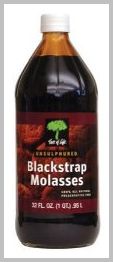
As is this: Plantation Blackstrap:
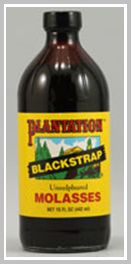
See also my chart in
Crude Black Molasses: A Natural “Wonder Food” (1949), Cyril Scott, 48pp., 500 + P&H. (+ my own chart comparing mineral/nutrient contents of 7 major brands); growths, stroke, arthritis, ulcers, dermatitis, eczema, psoriasis, high blood pressure, etc.
Someone recently emailed me this data:
Just wanted to let you know I did some nutrient checking on the sweeteners using the FDA database of tested foods. The Wholesome Sweetener molasses IS high in potassium. But Holiday Blackstrap which is a little cheaper and readily available is 82% higher in calcium and about 40% higher in iron. House of herbs molasses is lower in calcium but almost seven times as high in iron.
See below. I have a full excel spreadsheet:
| MOLASSES Unsulphured HOLIDAY, BLACKSTRAP, 45035055 UPC: 070258026169 | Molasses Organic 45012638, WHOLESOME SWEETENERS, UPC: 012511600006 | Molasses,Blackstrap 45112163, HOUSE OF HERBS, UPC: 073060002109 | ||
| Nutrient | Unit | 1Value per 100 g |
1Value per 100 g |
1Value per 100 g |
| Energy | kcal |
200 |
273 |
400 |
| Protein | g |
0 |
0 |
0 |
| Total lipid (fat) | g |
0 |
0 |
|
| Carbohydrate, by difference | g |
52.38 |
63.64 |
100 |
| Fiber, total dietary | g |
0 |
0 |
|
| Sugars, total | g |
52.38 |
45.45 |
100 |
| Minerals | ||||
| Calcium, Ca | mg |
952 |
523 |
400 |
| Iron, Fe | mg |
17.14 |
12.27 |
84 |
| Magnesium, Mg | mg |
145 |
||
| Potassium, K | mg |
2929 |
3318 |
|
| Sodium, Na | mg |
48 |
0 |
100 |
| Vitamins |
0 |
|||
| Vitamin B-6 | mg |
0.909 |
||
| Vitamin C, total ascorbic acid | mg |
0 |
0 |
|
| Vitamin A, IU | IU |
0 |
Makuka Honey
Manuka honey is not a mild, good tasting honey (to the average palate*), but something taken daily as a nutrient and to use topically on wounds.
[* It would take a little getting used to. The flavor is not overpowering, but would be an acquired taste that one could eventually even like on a biscuit or such. If one did not know it was from the tea tree plant, they may think the honey has a bit of a thymol or eucalyptol flavor. In fact, the flavor is mildly reminiscent of that bactine spray, which, as a child, one's parent would spritz on a cut or abrasion. That may turn people off, but it is not that pronounced; subtle, but definitely noticeable. However, due to the very high price of the honey, I cannot see it being used as regular honey, more as a "treat" every now and then or a teaspoon a day, swished aroud the mouth to coat it well, and not drink or eat anything for 15 minutes or so to let it do its thing.]
Some claim there is no bacteria / virus which has been found that is resistant to it. It it supposed to kill bacteria and disease in the mouth, good for colds/virus, and some reports claim that topically it is more effective than the leading medication for herpes outbreaks. It is made exclusively from the pollen of the tee tree (or slang in Australian lingo, the "jelly bush") from New Zealand and Australia. Thus, is it far more expensive due to import cost. It may also be high priced because it is newer to the American market and has not caught on that fast, so price may come down as demand increases. However, it also depends how much of it is actually produced each year. Since there are a lot of tea trees, I imagine there is potential for a lot of product, but it also depends where those tea trees are and if it is possible to have the bee colonies nearby a tee tree plantation.
Consider Manuka and its price as a supplement, not a food or a sweetener; for I doubt the average person would put it on his biscuit, but take a teaspoon a day for prevention; or use it as a cure.
Some sources pay more for official analysis and certification and thus their brands are more costly; however, just because a smaller farm does not pay for certification does not mean their product is not just as good or potent; just that they cannot claim it to be so under certification.
I am curious to know if the bees that collect the tea tree pollen to produce this honey, are any healthier than any other bees, and whether they say, "G-day mate!" to the person who comes to collect their honey.
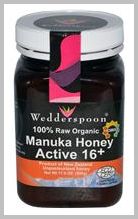
Not all Manuka honeys have the same active ingredients.
Some sources indicate that you should not get any Manuka honey without a minimum of 16+ UMF (old method) which is the same as 250+ MGO (new method). See these sites for more information on Manuka:
However, some low active ingredient Manuka honey like this has little to no actual powerful constituents for which Manuka honey is sought to fight disease and infection. For that, you will need a brand with this type of factors:

https://www.amazon.com/dp/B09RGJY54D?ref=ppx_yo2ov_dt_b_fed_asin_title&…
Raw Honey
Raw honey is better tasting and far more healthy than store-bought honey (which is often cut with corn syrup and not listed in the ingredients). Raw honey is also good for the medicine cabinet and for topical applications.
Last year, I had a cat, "Calie"(so named because she is a calico) apparently attacked by a coyote, which took a bite the size of a billiard-ball out of cat's lower chest/upper abdomen—when I noticed her a day later, the hollow wound was gray and stunk, she was in great pain, could barely walk, and I could see organs, ribs, and the chest and abdominal cavity. I had just received the day before the best raw honey I have ever tasted (wildflower, from Stakich.com). I mixed cayenne pepper (stops bleeding—even though the cat's wound was not bleeding, and it also increases circulation) with some raw honey and dribbled it on thickly with a spoon 2-3 times a day... she always licked most of it off (after a week I also thought to add cinnamon powder to it (another powerful antibiotic). I continued to coat the entire wound and opening 2-3 times a day. After a few treatments, she would try to escape when she saw me coming with the small honey/cayenne jar. Initially she was in such pain she could only walk gingerly away. After one day, the wound began to look better, after 4 days she was able to run slowly when she saw me coming with the honey jar (for the first few days I kept her on the porch in small cat kennel). After 6 days the wound was pink, no longer any gray/dead tissue, no smell, and appeared that the abdominal/chest cavity gaping wound was closing off. The wound healed completely in about 3 weeks, no infection, no medicine, never went to vet—and never even a scab!
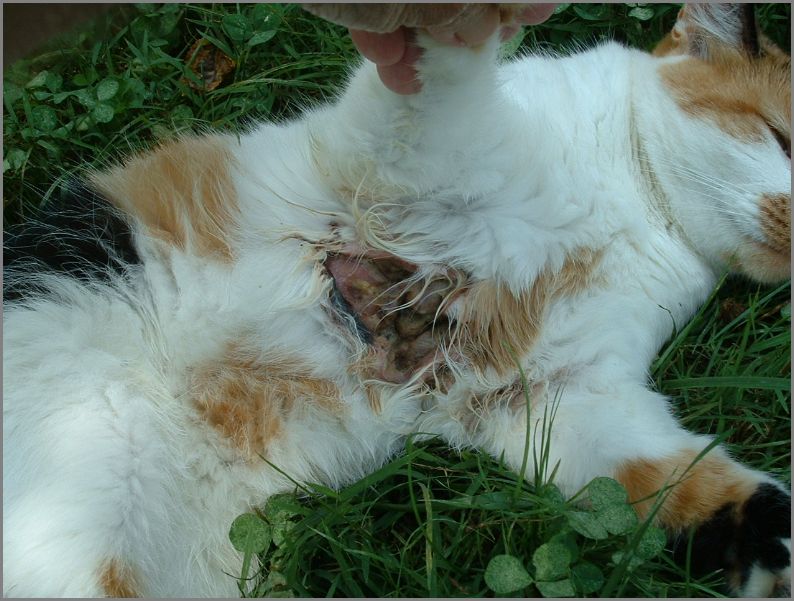
I recommened this as the best source for honey; the raw honey has such an incredible flavor you will never want any other honey; if you order a 5 gallon bucket the savings is around $60 over ordering 6 5-pound cannisters; an excellent source I recommend:
http://www.stakich.com/hfolder/honey.htm
[They also have antioxidant buckwheat/goldenrod honey (the darker the honey, the more antioxidant properties) and they have bulk lecithin and bee pollen, as well as bee propolis and royal jelly.]
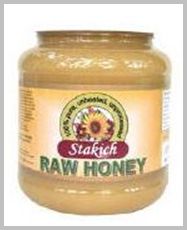
Stakich Honeyhas a consistency of apple sauce (that is, under the inch of more fluid honey at the top). If you order the 5-gallon bucket, you will need to transfer into your own glass jars, for honey, over time, will crystalize and a 5-gallon chuck of honey "rock candy" will be problematic; whereas, individual mason jars can be slowly heated on the stove, in a pan of water, to slowly reconstitute.
Another good brand is YS Echo Bee Farms Organic Honey, and a good source for it is:
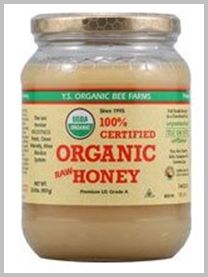
YS (pronounced "wise"...?) honey has the consistency of hard carmel. I don't know how they achieve this consistency. They claim it is due to its purity and call it "intense crystalization." However, it is creamy, buttery, with a very nice flavor (and they have buckwheat, mixed antioxidant, and other honeys infused with various antioxidants such as pomegranate). Maybe after it crystalizes they grind it up really smooth...? I don't know, it is not gritty, but creamy, even though very hard. I recommend it, and when different sizes/products are on sale, the price can be cheaper than store-bought honey; so compare the price per ounce.
Other Good Sugars
Agave Nectar and Cococut Blossom Nectar
Two other great low glycemic index sugars are organic raw Agave nectar or Agave syrup (from the heart/root of the large, blue agave succulent, a desert plant in Mexico and the s.w. U.S.) and organic raw Cococut sugar or more properly, Coconut blossom nectar crystals (which is the crystalized nectar of the tapped flower blossom of the coconut palm). Agave has a subtle maple syrup flavor, while coconut blossom nectar crystals has a very subtle coconut flavor with a full-bodied flavor like roasted barley or toast.
Madhava brand manufactures both. Currently, the best deals on both seem to be through Amazon.com with subscribe and save. Madhava has many flavored agave (hazelnut and amaretto are excellent in coffee) and though plain agave nectar has a subtle flavor similar to maple syrup, they also make a "maple syrup-flavored agave" that is nearly identical to maple syrup—and yet is cheaper per ounce and is lower glycemic index that maple syrup. Also Agave nectar will not crystalize over time, like honey or maple syrup will.
However, Vitacost and iherb also carry agave nectar and coconut sugar, and their sale prices are often competitive. See below for discounts on first order from Vitacost or iherb.
However, be certain that the agave you buy (if you buy it) is raw agave. See this important link, in which Dr. Mercola even suggests that no agave is healthy, not merely processed agave nectars:
Stevia
Stevia is also a natural sweetener with health benefits, made from the leaf of the semi-tropical South American Stevia rebaudiana plant (a member of the sunflower/aster family). It is much sweeter than sugar. However, it has zero carbohydrates, zero calories, and zero glycemic index. However, it seems to be lacking in depth of flavor, and can be unsatisfying, and even a bit bitter. See this link for more info on Stevia:
Monk Fruit
The Monk fruit (a.k.a. Buddha fruit or in Chinese lo han guo / luóhàn guǒ or in Vietnamese la hán quả) is about the size of an orange from sub-tropical Asia. It grows on the Siraitia grosvenorii vine (a.k.a. Mormordica grosvenorii); it is actually in the cucumber or gourd family. An extract is made from the fruit and is about 200-250 times sweeter than sugar and has zero calories.
Xylitol
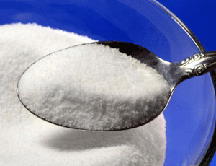
The book, The Secret Miracle of Xylitol, Fran Gore, 84pp., pb., 6.00 donation + P&H is highly recommended.
If Interested in a bulk source for 100% birch, GMO-free, non-Chinese Xylitol, e-mail for more information.
Xylitol is the Perfect Sugar - 100% natural (though produced by a complex chemical process). It was invented by a German chemist in the 1800s and it was used by the Finns during WWII; the sugar is Made from Corn cobs and Birch trees. Xylitol is alkaline, not acidic like other sugars.
- Tastes like regular sugar
- No Aftertaste
- 40% less Calories
- 75% less Carbs
- Low Glycemic Index Sugar
- Cannot ferment (because of its antibacterial properties and because of its molecular structure)
- Cannot carmelize
- Produces no increase in blood sugar or insulin (thus, diabetic safe)
- a truly healthy sugar:
- helps remineralize bones (thus good for those with osteoporosis) and teeth (many toothpastes and chewing gums are starting to use it);
- helps keep the mouth moiste (useful for people on medications that dry the mouth out);
- does not cause cavities—it actually prevents and can even heal small ones, killing bacteria in mouth that causes tooth decay;
- kills bacteria;
[A nose spray is even made from it (or you can make it yourself) and in addition to killing sinus bacteria, it clears up 95% of inner ear infections in children.]
More expensive than regular sugar, the price is coming down now that more people are starting to use it. On average, you can get it for about $6/pound in 5 pound bags; it is about $4.50/lb. by the 50-lb. bag; e-mail for info). It can be used 1:1 to replace regular sugar in any recipe (except, it cannot carmelize or ferment).
IMPORTANT
PLEASE NOTE: Though the body produces small amounts of xylitol each day, the GI-tract does not know how to process it efficiently, right away, and a period of acclimating your system to it is important. Some people try xylitol, eat too much at first, and think, "My body can't handle it. It upsets my stomach..." and thus, they think they have an allergy to it and never eat it again— and thus rob themselves of the benefit of this amazing sugar, because of ignorance.
Since it will be a new substance to the digestive system of the person who has never eaten it before on a regular basis, it will take a week or two for your body to adjust to it.
What I did, was use only 1/2 a teaspoon in my coffee or tea and only drank 1 cup of tea or coffee with it in it every few hours to start with... or sometimes I would simply take 1/2 teaspoon and eat it straight. If my stomach grumbled too much (pay attention to your body)... I took less, maybe 1/4 teaspoon, or I took it less frequently (every 4 hours instead of every 2). Your body will let you know. Pay attention to it. Once your body learns how to process it efficiently, rarely will you notice any discomfort, unless you consume way too much—and if you do, the xylitol is not the problem... the problem is consuming too many sweets... and you should thank God for those who discovered xylitol, for xylitol can act like the nagging "good angel" on your shoulder to remind you not too eat so many empty calories that will only cause you to gain weight and pave the way for a whole host of serious health problems.
Understand, sweets are not my thing. I like them every now and then, but do not like things sweet all the time, and do not like things overly sweet. However, I do not consider xylitol as a candy or a treat, I consider it a health supplement and when I use it, I use it with that in mind, not because I want something sweet. It is not that a person should not use xylitol if they want something sweet... to the contrary, it is one of the best sweets you can consume. However, also remember to think of it as a health supplement, good for your teeth, bones, and something that kills bacteria and possibly other harmful microbials.
Also, you can put the sugar directly into your mouth, by itself, and let it dissolve and hold in the mouth, this will help kill bacteria in the mouth even better than brushing... in fact, if you make your own candy/mints or cookies, desserts, etc. with xylitol, or if you have an after-meal coffee or tea and use xylitol, you don't even need to brush afterwards. Small cavities in the teeth, according to some dental authorities, can be healed by the teeth. This was known even before the modern advent of Xylitol. Thus, xylitol used regularly, should be able to help the body even greater to heal bones and teeth.
However, do note:
Xylitol can be fatal to dogs, depending on how much they ingest, since their bodies cannot deal with it for some reason... so do not feed it to your dog and don't leave it or anything made with it lying around somewhere that your dog can help himself to it.
Testimonial: For many years my teeth were ultra sensitive. I had to use Sensidyne toothpaste, I could not drink anything too hot or too cold, certain amounts of sugar or certain spices hurt my teeth. I started using the Xylitol, for the health benefits, in my decaff coffee/herbal tea (which I normally do not sweeten)—my teeth are no longer sensitive to hot or cold.
Erythritol
Also, there is another product similar to Xylitol, called Erythritol; it is another sugar alcohol and it seems to have many of the same properties and benefits. It is produced by fermenting glucose with the yeast Moniliella pollinis. It was discovered in 1848 by the British chemist, John Stenhouse. One benefit of Erythritol over Xylitol is that it is less likely to cause gastric disturbance, due to how the body digests it (only 10% enters the colon; the other 90% is absorbed in the small intestine). It is also much harder for bacteria to digest, so there is less chance of bloating, gas, and does not contribute to yeast or candida growth.
Erythritol is naturally occurring in a wide variety of plants (such as pears, melons, and grapes, but also in mushrooms, wine, cheese, and soy sauce) and animals and even the human body.
It is about 70% as sweet as table sugar and is free-flowing since it is non-hygroscopic.
It has zero calories; is safe for diabetics since it does not change blood serum glucose or insulin levels; it has a zero glycemic index.
It does not contribute to tooth decay (oral bacteria cannot digest it), but actually helps inhibits plaque formation and cavities (controls S. Mutan bacteria); but it is not as powerfully anti-bacterial a Xylitol is. But like Xylitol, Erythritol helps to remineralize tooth enamel.
For a good source for bulk Xylitol and Erythritol (Natural, GMO-free), email me.
However, a recent study claims that Erythritol is harmful to the brain...
https://www.earth.com/news/common-sweetener-may-directly-damage-the-brain/
Both Pepsi (PureVia) and Coke (Truvia) have developed their own "Natural sugar" blends. Purevia is a dextrose, stevia blend (with other sweeteners and flavors) and Truvia is stevia,* Erythritol, and other natural flavors.
* Wikipedia reports: "In fact, Coca Cola's patent describes a 42-step procedure to derive Rebiana from the stevia leaves, using such chemicals as acetone, methanol, acetonitrile, isopropanol, tert-butanol and "mixtures thereof". Whether Truvia can truly be classed "natural" seems, at the least, semantic."
Check out my foundational work, a very important book (though it is not health related, I mention it here for those who might not view the other pages at this site):
Uncovering the Mysteries of Your Hidden Inheritance
— #1 - Uncovering the Mysteries of Your Hidden Inheritance [The Foundational Work, this is the book to start with] UPDATED
[Back to Important Health Information and Books — "Main Menu"]
